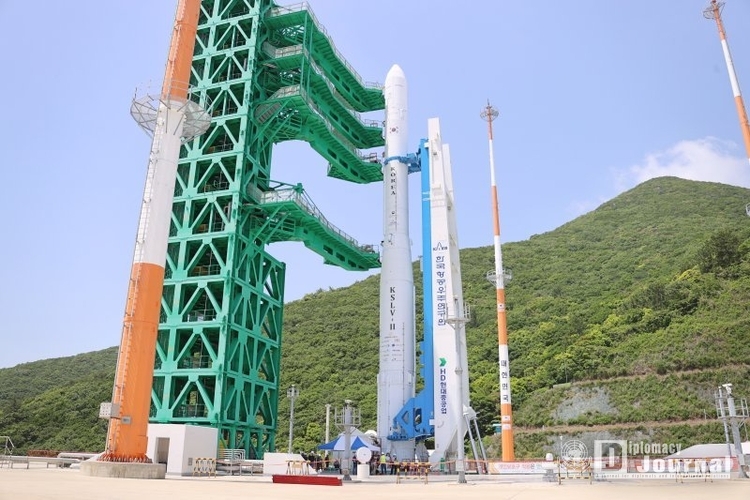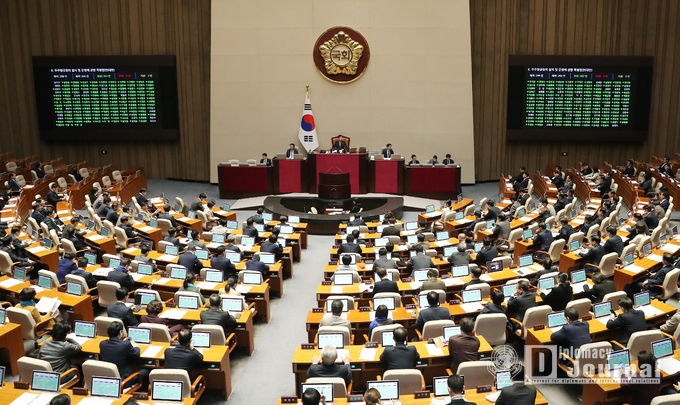By Lee Kap-soo
The Korea Space Administration Act, which has been called the "Korean version of NASA," has passed the plenary session of the National Assembly. At the plenary session of the National Assembly on Jan. 9, the 'Special Act on the Establishment and Operation of the Korea Aerospace Administration' (KAIA Act) was passed with 263 votes in favor, 0 against, and 3 abstentions out of the 266 lawmakers present.
The enactment of the Act follows President Yoon Suk-yeol's pledge to establish a national control tower to lead space development.

The bill establishes the agency under the Ministry of Science and ICT, which is also placed under the direct supervision of the President’s National Space Commission.
The bill crossed the threshold of the National Assembly nine months after it was introduced as a government legislation in April last year. It will take effect four months after its promulgation. As a result, the space agency is expected to be established in Sacheon, Gyeongsangnam-do, as early as May or June this year.
Previously, the ruling and opposition parties had disagreed over the agency's "direct R&D" function until the last minute. The ruling People Power Party has argued that the agency should be in charge of a wide range of research that Korea Aerospace Research Institute (KARI) cannot do, but the Democratic Party has opposed it, saying it could overlap duties with KARI.

The ruling and opposition parties reached a consensus by placing KARI and the Korea Astronomy and Space Science Institute (KASI) under the umbrella of the Korea Aerospace Administration, explaining that KARI would continue its existing research, and the administration would naturally conduct R&D.
The agreement also requires the National Assembly to approve the relocation of the headquarters of KARI and KASI, currently located in Daejeon.
The ruling party accepted the opposition's concerns about the move and agreed to enact the provision into law. There are analysts who believe that the Democratic Party's concern over the relocation of the two institutions was heightened by the fact that Rep. Cho Seung-rae of the Democratic Party of Korea, the opposition leader for defense, has a district in Daejeon that includes KARI and KASI.
The bill also includes a special provision that allows the agency to set remuneration standards for tenure-based officials independent of the National Civil Service Act, as well as strengthening the space industry cluster function.
The amendment to the Space Development Promotion Act seeks to reorganize the National Space Commission by upgrading its chairman from the current Prime Minister to the President.
Since April last year, when the government bill was submitted to the National Assembly, it has been stalled in the standing committee for nine months due to sharp differences between the ruling and opposition parties, and even the establishment of an agenda coordination committee within the Ministry of National Defense to expedite its passage has failed to narrow the differences.
The People Power Party criticized the opposition for holding up the establishment of the space agency, a national priority of the Yoon administration, while the Democratic Party demanded that the screening of the bill be continued, saying it could not be processed in a hurry.
However, with three months to go before the general election, the debate has picked up pace as voices from industry, academia, and residents of Gyeongnam Province are calling for the agency to be established as soon as possible to secure national space competitiveness and strengthen the space industry.
Earlier, Choi Jae-ho, chairman of the Gyeongnam Chamber of Commerce and Industry Council, urged on behalf of the local business community at a press conference in front of the National Assembly's main building on Dec. 26 last year, "The establishment of the Korea Aerospace Administration should not be viewed as a political issue, but as the beginning of a hundred years of Korea's space industry and the practice of national balanced development."






